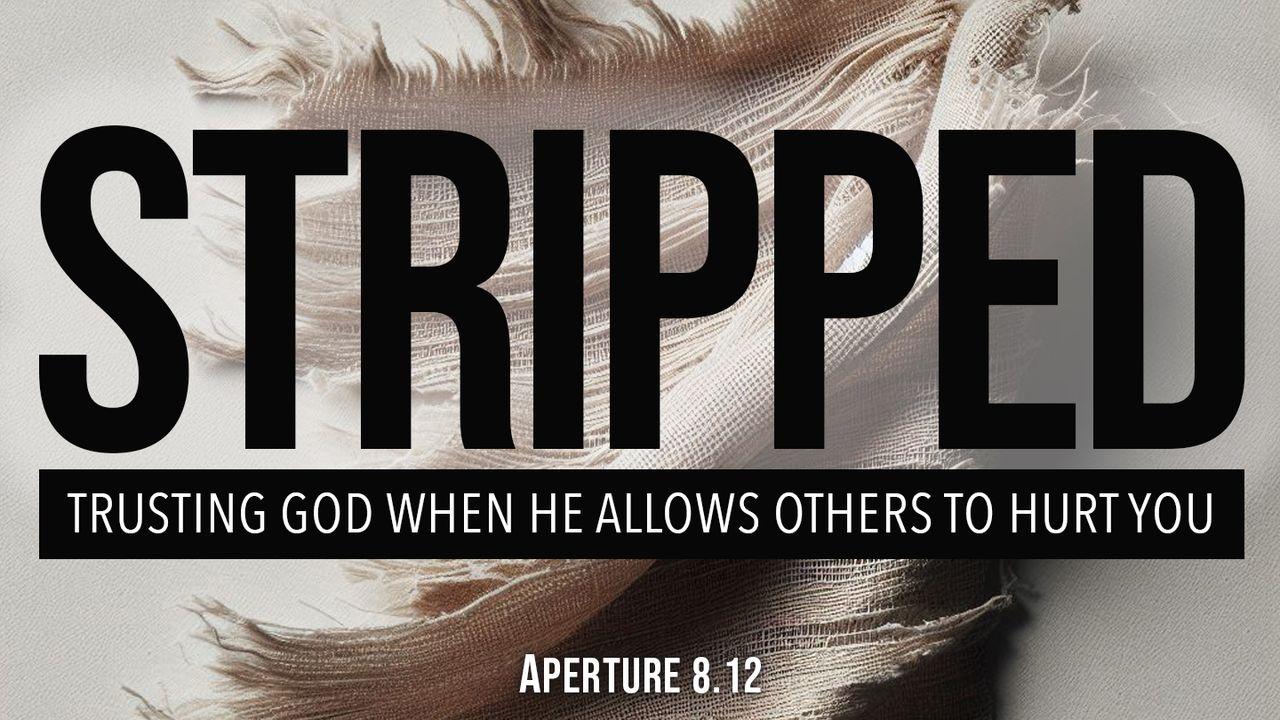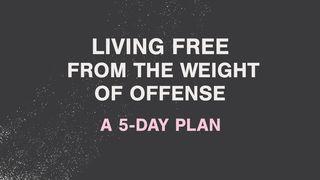Stripped: Trusting God When He Allows Others to Hurt YouSample

Across the world, people who once cared for each other are at striking odds that were never part of the plan. For millions more, the stripping was caused by strangers. Some never have to interact with the person who hurt them again, but for others, it’s unavoidable.
Some get their day in court, hoping for justice, while others wonder what they would do if they had a chance to exact revenge. All painful stories. All different circumstances. Yet, sooner or later we must each answer the question: will I forgive?
Being on the receiving end of “I’m sorry for what I did to you” is out of our control—apologizing requires at least two people—but forgiving takes just one. One decision: harboring or releasing. Holding on or letting go.
It’s not necessary for me to express the obvious, but I will: this is hard. Extremely hard. Does it come naturally? Nope. Is it possible? It is when we abide in Christ.
I know some things are easier to forgive than others. Absolutely. And the size of the affront is usually a determining factor in how quickly we can achieve forgiveness. It’s different for all of us, but the commonality is that forgiveness is a choice. Much like choosing righteousness, we also must choose forgiveness, even if only for the sake of our healing.
You may have heard about the benefits of forgiving. According to Robert Enright, cofounder of the nonprofit International Forgiveness Institute, there is plenty of evidence that forgiveness has psychological benefits like reducing anger, anxiety, and depression. It can also have positive impacts on our health, including lower blood pressure, better sleep, lower levels of stress-induced inflammation and a stronger immune system.
Forgiveness does not mean that you justify the perpetrator. It doesn’t mean you have to become best friends with them either, or that relationships will be restored to what they used to be or better, or that you don’t seek justice where infraction of law occurred, although it might include that for some of us. Forgiveness is about extending mercy to those who hurt us. And mercy can only be bestowed when we recognize we’ve been the recipients of mercy too.
I know there are some acts so heinous it’s almost unbearable to imagine forgiving. Please, hear my heart in these words. Even though I don’t know the details of your story, I understand if that is how you feel. There are things I imagine being unable to forgive if they happened to me. I understand, my friend. And I know the Lord understands too.
When He asks us to choose this path, it’s because He knows it’s the best path forward for us. He will judge each person according to their deeds, and invites us to trust in the redemption He can work out for our lives when we release ourselves and those who hurt us from the binding, destructive power of unforgiveness. Instead of allowing our healing to be complete, it provokes more pain and damage, and takes away our joy, freedom, and ability to move into the purposes and plans God has prepared for us.
The Bible addresses forgiveness dozens of times, both in the Old and the New Testament. God understands all about it! He constantly forgave a “stubborn people” who continuously sinned against Him. Their sins were detestable to God, and yet He urged them time after time to turn from their wicked ways and repent, promising He would forgive them.
When teaching his disciples to pray, Jesus taught us to forgive one another just as God forgave us.
“For if you forgive other people when they sin against you, your heavenly Father will also forgive you. But if you do not forgive others their sins, your Father will not forgive your sins.” (Matthew 6:14-15, NIV)
Jesus not only established forgiveness as a condition for our own forgiveness, He modeled what it looks like. One of the most well known verses on forgiveness was uttered by Him as He hung on a cross, dying for the sins of the world.
And with His last breaths, He prayed, “Father, forgive them, for they do not know what they are doing.” (Luke 23:34, CSB)
This is the ultimate display of forgiveness: the Creator of the Universe forgiving sinners, even as they were crucifying Him. And He asks us to do the same. Not by our own might, but leaning in and drawing close to Him so that we can be imitators of Him.
When we submit to God’s will and ask Him to help us grant forgiveness, He doesn’t expect us to do it alone. He gives us the ability and power through His Spirit that lives in us. So, how do we get there, where do we start?
We start at the cross, looking to Jesus. However long it takes. If you have to pray about it daily, pray about it daily. Tell God exactly how you feel and why it’s hard to forgive. Ask Him to help you, to take that anger and bitterness from your life, and nail it to the cross along with your sins and all the wrong we’ve done against others and against God.
Forgiveness is not about who is right or wrong. Forgiveness is always undeserved. Even if you are never asked for forgiveness, you can still grant it. You might not be able to tell the person who hurt you that you forgive them, but doing so, even in your heart, will release you from the power that person could still have over you if you don’t.
Forgiveness opens the prison cells of pain, bitterness, and anger, so you can walk out freely with peace, healing, and joy. Over time, when we realize how much we’ve been forgiven, it can be easier for us to extend forgiveness.
Some signs that you are on the path of forgiveness are that you:
- Genuinely pray for your enemies
- Extend mercy if the opportunity arises
- Express less anger and resentment
- Are grateful for other things in your life, despite the challenges you are facing
- Resist the urge to gossip and slander
- Are fruitful in the land of your suffering
- Laugh more and are less consumed by pain
FORGET - FRUCTIFY - FORGIVE
Three life alterations that ensured his future was no longer stripped, but clothed in fine linen.
To meditate:
- Take time to meditate and pray over the three alterations discussed: forget, fructify, forgive.
- What advice can you implement in your life to help you forget?
- How is abiding in Jesus related to being fruitful in the land of our suffering?
- What is hardest for you when it comes to forgiving?
- Are there evidence of forgiveness in your life or what do your actions reveal about where you are in the process?
- Have you ever experienced what forgiveness feels like on the receiving end? How does that resonate with Jesus’ directives about forgiving?
About this Plan

Using Joseph’s dramatic story as the framework, Stripped addresses the struggle to reconcile God’s love with inflicted pain. If He loves us, why does He allow others to hurt us? It addresses how to find hope and intimacy with God, despite the pain of being stripped, trust in His plans and power to redeem our stories, be successful in the land of our suffering, and forget, fructify, and forgive. This devotional is adapted from the book "Stripped: Trusting God When He Allows Others to Hurt You" by Karenlie Riddering, available on Amazon and Kindle.
More
Related plans

Abiding in the Vine

Devotions on F.I.R.E. Year Two

Prayers on Fire for Men: 7 Days Rediscovering the Fire of Your Faith

Promises (S4-E1)

God, Where Are You?

Thirty Psalms for Thirty Days - Discover God's Character

Grief Survivor: 30 Steps Toward Hope and Healing

CHRISTMAS - ADVENT - Good News, Great Joy - Jean-Luc Trachsel

Living Free From the Weight of Offense
